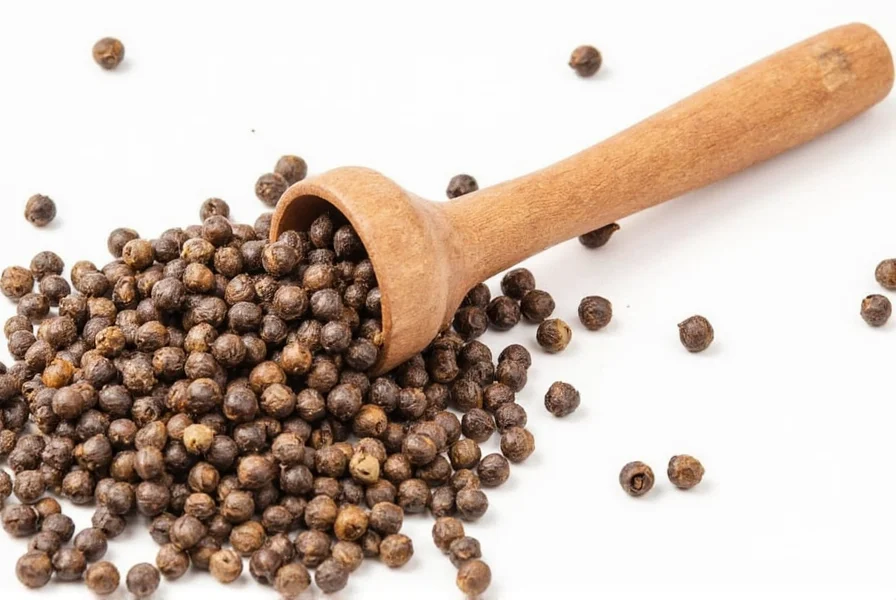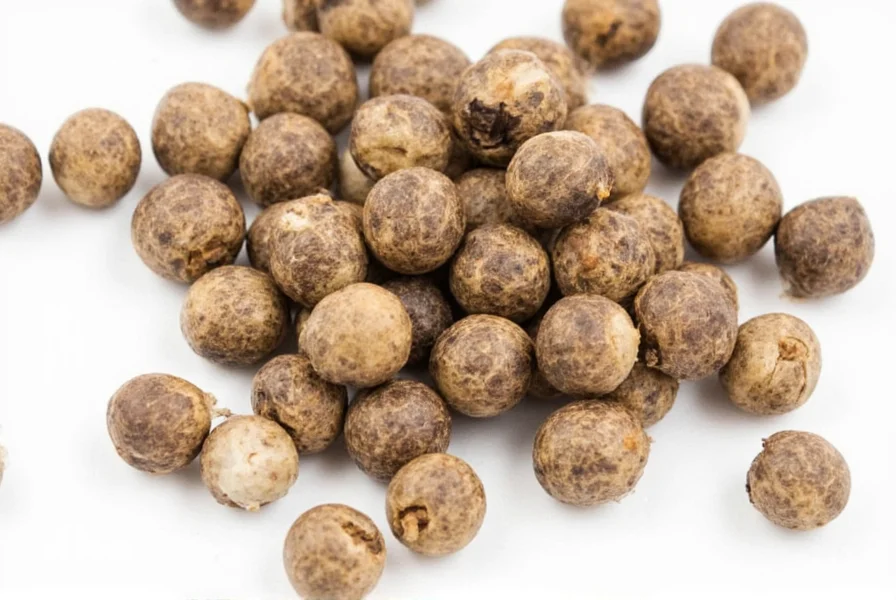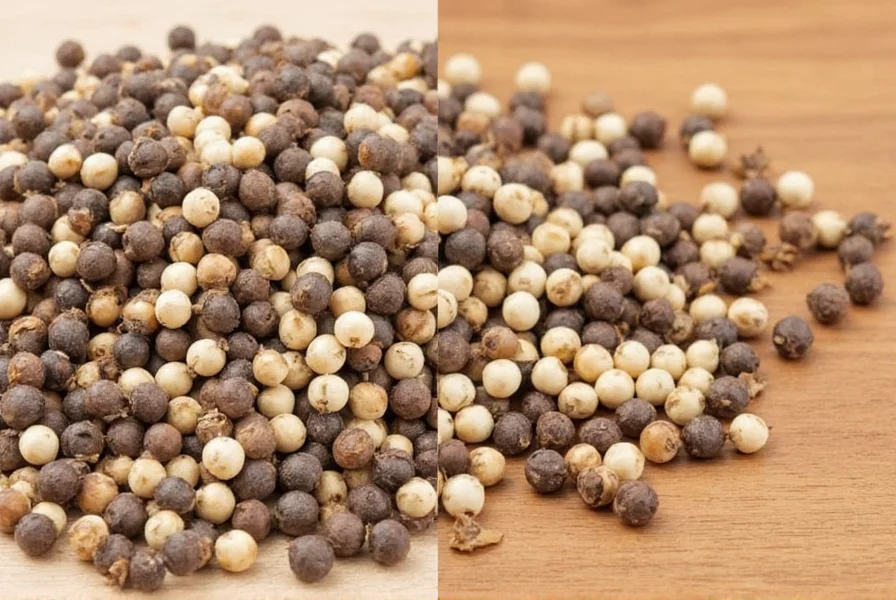If you've searched for \"wite pepper\" thinking it's a distinct spice variety, you've likely encountered a common misspelling. The correct term is white pepper, an essential culinary ingredient with unique properties that distinguish it from its more popular counterpart, black pepper. Understanding white pepper's production process, flavor profile, and appropriate culinary applications can significantly enhance your cooking repertoire.
What Exactly Is White Pepper?
White pepper originates from the same Piper nigrum plant that produces black pepper. The key difference lies in the processing method. While black pepper uses unripe green berries dried in the sun, white pepper comes from fully ripe berries. Producers soak these ripe berries in water for about a week, which causes the outer layer to ferment and loosen. After this soaking process, workers remove the outer skin, leaving only the inner seed, which is then dried to create white peppercorns.
| Pepper Type | Processing Method | Flavor Profile | Common Culinary Uses |
|---|---|---|---|
| White Pepper | Ripe berries with outer layer removed | Milder, earthier, less complex | Cream sauces, mashed potatoes, light soups |
| Black Pepper | Unripe berries dried in sun | Sharp, pungent, complex | Most savory dishes, marinades, rubs |
| Green Pepper | Unripe berries preserved | Fresh, herbal, mild | Asian cuisine, sauces, dressings |
White Pepper vs Black Pepper: Key Differences
The most noticeable difference between white and black pepper is appearance—white pepper lacks the dark specks that black pepper provides. This visual distinction makes white pepper ideal for dishes where appearance matters, such as béchamel sauce, potato salad, or white wine reductions.
From a flavor perspective, white pepper offers a more singular, earthy taste compared to black pepper's complex blend of floral, piney, and citrus notes. Many chefs describe white pepper as having a cleaner heat that builds gradually, while black pepper delivers an immediate, sharper punch. This difference in flavor profile means they're not always interchangeable in recipes.
Culinary Applications of White Pepper
Chefs worldwide utilize white pepper for specific culinary purposes where its unique properties shine:
- French cuisine: Essential in classic béchamel and other white sauces where black specks would be visually disruptive
- Chinese cooking: A staple in many traditional recipes, particularly in dim sum and seafood dishes
- Light-colored soups: Perfect for consommés and cream-based soups where appearance matters
- Processed meats: Commonly used in sausages and deli meats for consistent color

Nutritional Profile and Health Benefits
Like black pepper, white pepper contains piperine, the compound responsible for pepper's heat and many of its health benefits. Research suggests piperine may enhance nutrient absorption, particularly of curcumin in turmeric. White pepper also provides small amounts of manganese, iron, and vitamin K.
While both pepper varieties offer similar nutritional profiles, some people with sensitivities find white pepper easier to digest than black pepper. This makes it a valuable alternative for certain dietary needs.
Selecting and Storing White Pepper
For optimal flavor, purchase whole white peppercorns rather than pre-ground powder. Whole peppercorns maintain their potency significantly longer. Look for plump, uniform grains with a pale yellow to light tan color—avoid any with dark spots, which indicate improper processing.
Store white pepper in an airtight container away from light and heat. Properly stored, whole peppercorns retain their flavor for 2-3 years, while ground white pepper begins losing potency after about 6 months. For the best culinary results, grind white pepper just before use using a dedicated pepper mill.

Popular White Pepper Recipes to Try
White pepper shines in recipes where its subtle heat and clean appearance enhance rather than dominate:
- Creamy mushroom risotto: Adds warmth without visual disruption
- Classic French onion soup: Complements the rich broth without black specks
- Seafood beurre blanc: Perfect pairing with delicate fish flavors
- Homemade mayonnaise: Provides subtle heat in this versatile condiment
When substituting white pepper for black pepper in recipes, use about 25% less initially, as white pepper's heat builds more gradually. You can always add more to taste.
Common Questions About White Pepper
Is white pepper just bleached black pepper?
No, white pepper isn't bleached black pepper. It's made through a natural fermentation process where ripe peppercorns soak in water to remove the outer layer. This traditional method has been used for centuries and doesn't involve chemical bleaching.
Can I substitute white pepper for black pepper in recipes?
You can substitute white pepper for black pepper, but the flavor profile differs. White pepper offers a milder, earthier heat without black pepper's complex notes. In light-colored dishes, white pepper works better visually. For most other applications, black pepper provides more nuanced flavor. When substituting, start with 25% less white pepper than the recipe calls for black pepper.
Why do some people prefer white pepper over black pepper?
Some people prefer white pepper for culinary, digestive, or aesthetic reasons. Chefs often choose it for light-colored dishes where black specks would be undesirable. Certain individuals find white pepper easier to digest than black pepper. In specific cuisines like traditional Chinese cooking, white pepper is preferred for its cleaner heat profile that complements delicate flavors without overwhelming them.
Does white pepper have the same health benefits as black pepper?
White pepper contains similar beneficial compounds as black pepper, particularly piperine, which enhances nutrient absorption. Both varieties offer comparable antioxidant properties and potential digestive benefits. The main difference lies in concentration—black pepper typically contains slightly higher piperine levels, but white pepper remains a valuable source of these health-promoting compounds.











 浙公网安备
33010002000092号
浙公网安备
33010002000092号 浙B2-20120091-4
浙B2-20120091-4